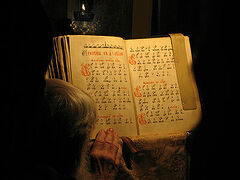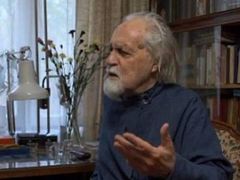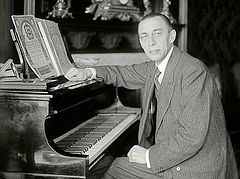Sergei Rachmaninoff is probably one of the most Orthodox Russian composers. Sure, he never served in the Church or wrote Church music, but his All-Night Vigil is considered by many to be the pinnacle of Russian sacred art. We spoke with Valeria Nollan, PhD in Russian Studies and pianist from the United States, who recently wrote one of the few North American biographies of the maestro explaining how Orthodoxy was evident in this great composer’s self-identity and why the Americans recognize him as one of their own. Her book “Sergei Rachmaninoff: Cross Rhythms of the Soul” was published last year.
 Sergei Vasilyevich Rachmaninoff
Sergei Vasilyevich Rachmaninoff
—Valeria Valentinovna, why did you become interested in Rachmaninoff’s work as an Orthodox composer?
—To begin with, I am a Russian Orthodox Christian myself and I would like to educate people in understanding Orthodoxy. It is possible to say that I grew up with Rachmaninoff’s music: my parents and friends—all of them have listened to his works, I played his music on the piano, and used it in performances.
The entire identity of Rachmaninoff is defined by Orthodoxy
Orthodoxy defines Rachmaninoff’s entire identity. The existing biographies of the composer make no mention of it at all. People knew nothing about the icons, liturgy, sacred music, or the peculiarities of an Orthodox person’s life. But this fact determines everything —how we pray, how we say goodbye or how we greet one another, how we confess and receive communion. An average American doesn’t realize this at all. Even the Catholics.
One English-speaking biographer wrote that Rachmaninoff was a non-believer. This is completely false. What we see here is a complete misunderstanding of Rachmaninoff, his Russian identity and Orthodoxy, in general.
Rachmaninoff had a very tragic life, but also a very interesting one. He was able to overcome all the obstacles, such as living in various countries, switching between cultures, and changing of the mode of life. These are very serious events.
Rachmaninoff’s generation is that of my parents. They were respectable and well-educated people, and as a child I saw how difficult it was for them to live in the West.
 Valeria Nollan —Why do you think the people in the West don’t really associate Rachmaninoff with Russia and Russian Orthodoxy?
Valeria Nollan —Why do you think the people in the West don’t really associate Rachmaninoff with Russia and Russian Orthodoxy?
—As for Orthodoxy, Rachmaninoff never “advertised” his faith in public; but from a humanitarian point of view, he supported many things in Orthodox life. However, he kept quiet about it, displaying it only within the circle of his family and friends.
I don’t know why Americans don’t consider him a Russian American, but in my opinion, they generally don’t give much thought to different ethnic groups. As for Rachmaninoff, he somehow got involved in the American lifestyle because he spent a lot of time here—he left Russia in 1917, spent a year in Europe, and then, between 1918 and 1943—and that’s a long time, a quarter of a century, he mostly lived here. That’s why we can say that he also belonged to America. He worked here, earned money, and then worked in Europe in the summer, where he composed music, and where he was physically closer to Russia, living among other Russian musicians and artists. He was also closer to the Orthodox Church there, which at that time was better represented in the Old World than here in the U.S.
—In your opinion, can Rachmaninoff be called the most Orthodox Russian composer, or at least one of the most? And if so, in what sense?
—I would say yes. It’s a very good question, but I don’t think he ever set himself such a task. I think that, for Rachmaninoff, art and music were front and center. But he drew his inspiration from Russia, the Russian nature and Russian culture—both musical and artistic.
He grew up in all of that. And, certainly, he is an Orthodox composer and musician. It’s simply that his music was derived from his Russian and Orthodox identity. Rachmaninoff himself said that everything he had was given to him by God. These words are often quoted in scholarly works about him, and they are generally well known.
His drew his inspiration from Russia, Russian nature and Russian culture, both in music and art
At the same time, we also know that Rachmaninoff greatly helped the Russian Church Outside of Russia. For example, along with other donors, he financially supported the founding of the St. Sergius Orthodox Theological Institute in Paris. He regularly offered financial support to the Russian Orthodox Church Abroad in the United States, assisted the clergy in Alaska, and the Russian Orthodox Church in various European countries. The list could go on. But he never talked about these things, and we know this only from the letters of others how much he helped, donated, and supported. We can say that he undoubtedly helped Russian Orthodoxy in the West to get back on its feet.
—Many people believe that Rachmaninoff grew bolder in faith in his music exactly at the time when others kept losing it. Do you agree with that?
—Yes, I fully agree.
—As a young man, Rachmaninoff admired Leo Tolstoy, but when they met in person, they did not like each other. Can this be explained, among other things, by the divergence of their spiritual views?
—I wouldn’t jump to that conclusion. Yes, indeed, they met and didn’t like each other. But I don’t think it was a matter of faith. If I’m not mistaken, Rachmaninoff was with Chaliapin, and they met Tolstoy twice. Tolstoy had his pluses and minuses and so he could get annoyed. So, perhaps, being as young as they were at the time, they came to him at an inopportune moment. Sergei Vasilyevich played a few short pieces, but Lev Nikolayevich was very critical of Beethoven, whose music by the way he loved and even played himself. Tolstoy wanted all art to be Christian. So, it could be that he looked at Rachmaninoff’s music through this prism.
But I think it is more likely that they clashed not over faith, but over art.
—I find it strange that the Russian Church, as well as the Church Outside of Russia, is not really celebrating the Rachmaninoff’s anniversary this year. Why do you think this is so?
—I think that the Church does pay tribute to Rachmaninoff. For example, I gave a lecture organized by the Museum of Russian History and the Holy Trinity Theological Seminary in Jordanville. Many people from different countries, approximately three hundred of them, registered for this lecture online. Besides, Russia announced that 2023 will be the Year of Rachmaninoff. I also think that, in its own way, the Russian Church is also marking the anniversary of his birthday and death.
Rachmaninoff can be characterized as someone who maintained neutrality between the Church and secular society. He was neither a priest nor a deacon, but Orthodoxy determined his whole life. At the same time, he remained a secular composer and pianist.
—Is it possible that we ordinary people can find something in Rachmaninoff’s music that can soothe our souls and strengthen our faith?
—His sacred music is deeply rooted in the Orthodox faith. We know how he prepared himself before composing these works, studying not only the different kinds of chants, but also the original Byzantine sources. He really loved the sound of the Russian bells and incorporated Orthodox bell chimes into his most famous compositions. We can feel our own Orthodox roots through his sacred and choral music. His sacred music is truly Russian, and his compositions of it are inspired by the Russian sacred tradition. It manifests indescribable beauty, and it is rooted in Orthodoxy.



